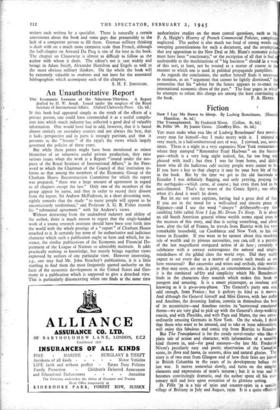Fiction
Now I Lay Me Down to Sleep. By Ludwig Bemelmans. (Hamis Hamilton. 8s. 6d.)
The Transplanted. By Frederick Niven. (Collins. 8s. 6d.) St. Felix '39. By Jeanne Gone. (Geoffrey Bles. 8s. 6d.)
You must make what you like of Ludwig Beinelmans' first novel every man for himself—but I make merry with it. I enjoyed i very much, in a half-embarrassed sort of way. yawned, too, some times. There is a night in a very expensive New York restaurant where they stamped "Remember Pearl Harbour " on the butter pats—which is a very long night indeed, far, far too long and pleased with itself ; but then I was far from home, and didn't know who all the ludicrous café society people were meant to be. If you have a key to that _chapter it may be your best bit of fun in the book. But by the time we got to the old hacienda in Ecuador I was definitely flagging, and only praying, praying for the earthquake—which came, of course ; but even then had to be anti-climaxed. That's the worst of the Comic Spirit ; too ofte when it's dead it won't lie down.
But let.me not seem captious, having had a great deal of fun. If you are in the mood for a well-salted and sincere piece of flippancy—and I use the word " sincere " deliberately—try this rambling fable called Now I Lay Me Down To Sleep. It is about an old South American general whose wealth seems equal even to the excesses of this story, and that is saying something, and about how, after the fall of France, he travels from Biarritz with his very remarkable household, via Casablanca and New York, to his old home in Ecuador. If you want to be earnest about this mocking tale of wealth and its piteous necessities, you can. call it a parable of the last magnificent rearguard action of de luxe ; certainly it celebrates with a correct extravagance the naiveté and single- mindedness of the gilded class the world over. Did they really expect to eat every day as a matter of course such meals as are here recounted? But casseroles and wines and orchids, olde worlde as they may seem, are not, in print, an entertainment in themselves ; it is the combined oddity and simplicity which Mr. Bemelmans finds in the characters they nourish which makes this book so pungent and amusing. It is a smart picaresque, as insolent and knowing as it is go-as-you-please. The General's party sets out, odd enough, from France ; but it gathers its kind as it moves. And although the General himself and Misi Graves, with her coffin and Anselmo, the dreaming Indian, contain in themselves the best of its eccentricity—and Anselino carries its unstressed emotional theme—we are very glad to pick up with the General's sleep-walking cousin, and with Plaschke, and with Papa and Mama, the two extra- ordinarily amusing Germans in New York. On the whole, I think OW those who want to be amused, and to take or lease admonition, will enjoy this fabulous and comic trip from Biarritz to Ecuador.
But The Transplanted is for the steady novel-reader who likes a plain tale of action and character, with information of a sensible kind thrown in, and—for good measure—the late Mr. Frederick Niven's peculiarly easy and poetic observation of the Canadian scene, its flora and fauna, its seasons, skies and natural glories. The story is of two men from Glasgow and of how their fates are joined in British Columbia in the years of its development before the last war. It moves somewhat slowly, and turns on the simpler dements and expressions of men's natures ; but it is true and it becomes convincingly dramatic, and the author spent all his cus- tomary skill and love upon evocation of its glorious setting.
St. Felix '39 is a 'tale of spies and counter-spies in a seaside village of Brittany in July and August, 1939. It is a quite effective
story, and its topographical details will appeal to those who used to know Brittany in holiday-time, and will probably make them restless. But I take it to be a first novel, and I suggest to the young author that, if she will use the dangerous device of making the lovely heroine the narrator of the tale, she should forbear from having all the other characters smother her in compliments—as to her looks, her wits, her sensibility, &c. It is playfully meant, no doubt, but it is quite the wrong way to put the girl over.
KATE O'BRIEN.



























 Previous page
Previous page